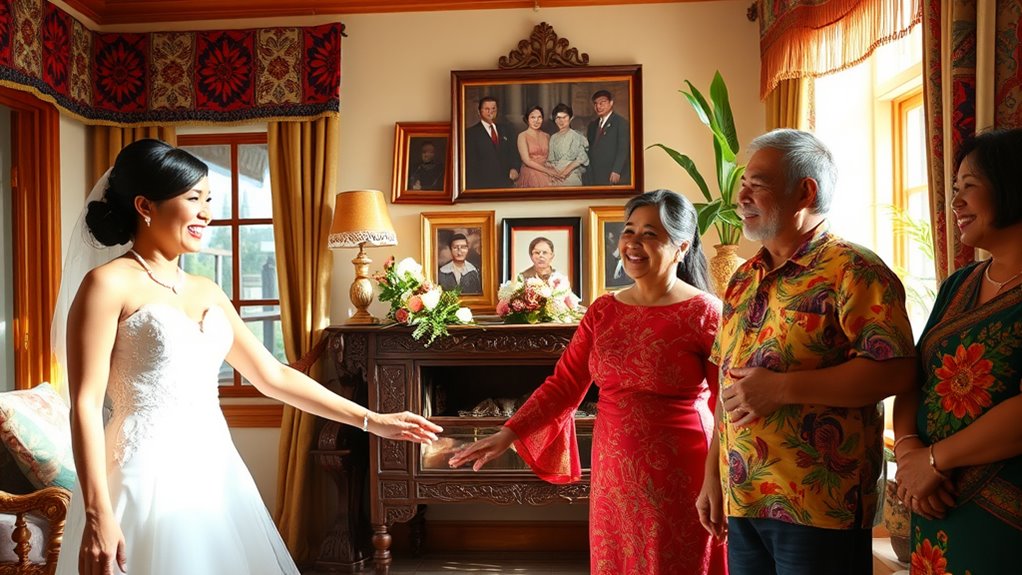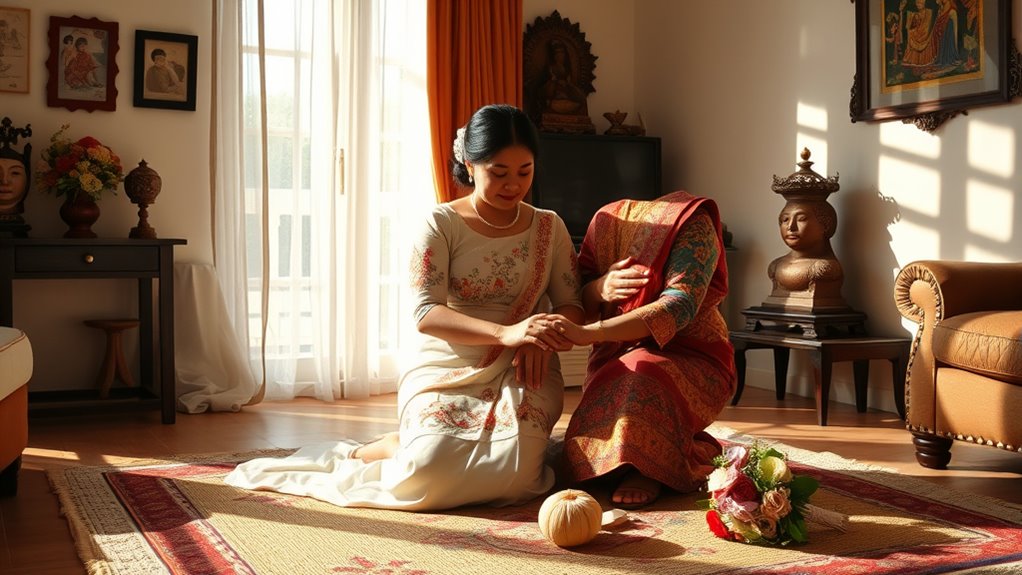In a Filipina marriage, in-laws are essential for emotional support and steering cultural expectations. They serve as guides, helping you adapt to family traditions and dynamics. With their involvement in family gatherings and rituals, you’ll find a strong sense of community. Open communication is key to building a positive relationship, ensuring everyone’s feelings and expectations are heard. Embracing these connections can lead to a more harmonious marriage, and there’s much more to explore about fostering these bonds.
Key Takeaways
- In-laws provide emotional and practical support, helping couples navigate the challenges of marriage and family dynamics.
- Family traditions and cultural expectations guide roles and responsibilities within the marriage, influencing decision-making and daily life.
- Open communication about feelings and expectations fosters strong relationships with in-laws and enhances marital harmony.
- Participation in family gatherings demonstrates commitment to the family unit and strengthens bonds with in-laws.
- Active listening and respectful dialogue help to navigate cultural nuances and build a supportive environment within the family.
The Importance of Family in Filipino Culture

In Filipino culture, family isn’t just important; it’s the cornerstone of social life. You’ll notice that relationships extend beyond the nuclear family, creating a vast network of support.
When you join a Filipino family, you’re not just gaining a partner; you’re becoming part of a tightly-knit community. Family gatherings are frequent, filled with laughter, food, and shared stories, reinforcing those bonds.
You’ll find that respect for elders is paramount, and their advice often guides decisions. Commitment to family means prioritizing their well-being and happiness, which can shape your values too.
This emphasis on familial ties fosters loyalty and unity, creating a sense of belonging that’s hard to find elsewhere. Embracing this will enrich your experience and strengthen your relationships.
In-Laws as Support Systems
While marrying into a Filipino family, you quickly realize that your in-laws can become an invaluable support system. They often take on roles that help you adjust, offering guidance and encouragement through life’s challenges.
Your in-laws might share their experiences, helping you navigate marriage and family dynamics with ease. They celebrate milestones with you, providing emotional support during both joyful and tough times.
You’ll find that their wisdom and familiarity with family traditions can ease your adaptation into this new chapter of life. As you build your own family, your in-laws may also step in to lend a hand, whether it’s babysitting or simply offering a listening ear.
Embracing this support can strengthen your bond with them and enrich your marriage.
Navigating Cultural Expectations

Understanding cultural expectations can be essential for a harmonious marriage in a Filipino family. You’ll quickly realize that respect for elders and family ties play a significant role in your relationship.
Communicating openly with your spouse about these cultural norms will help you both navigate them more effectively. It’s important to attend family gatherings and participate in traditions, as this shows your commitment to the family unit.
Remember, your in-laws may have certain expectations regarding your role and responsibilities, so don’t hesitate to ask questions. Embracing these cultural nuances will strengthen your bond and create a supportive environment.
The Influence of Traditions on Marriage

Traditions greatly shape the dynamics of marriage in a Filipino context, influencing everything from courtship to family roles. When you enter a marriage, you’re not just uniting with your partner but also with their family and cultural practices.
You’ll likely find that customs such as the “pamamanhikan,” where families meet to discuss marriage, are essential. These traditions establish expectations and strengthen familial bonds.
Additionally, the emphasis on respect for elders can affect decision-making and daily life. Your partner’s family may expect you to uphold certain rituals or values, reinforcing their identity.
Understanding these traditions will help you navigate your marriage more smoothly and build a harmonious relationship with your in-laws, ensuring you respect their customs while establishing your own family dynamic.
Communication Strategies With In-Laws

Steering through the complexities of a Filipina marriage means developing effective communication strategies with your in-laws. Start by being open and honest about your feelings and expectations.
When discussing sensitive topics, choose your words carefully to avoid misunderstandings. Active listening is key; show genuine interest in their opinions and concerns.
Regularly check in with your in-laws to foster a strong relationship and demonstrate your commitment. Don’t hesitate to share your cultural background, as it can help bridge any gaps.
Use humor and warmth to lighten conversations, making interactions more enjoyable. Finally, set boundaries when necessary, ensuring that everyone respects each other’s space and values.
Balancing Independence and Family Ties

While it’s essential to maintain strong family ties in a Filipina marriage, carving out your independence is equally important.
You need to establish boundaries that allow you to nurture your relationship while still honoring your own identity and aspirations. Communicate openly with your spouse about your need for personal space and time.
Engage in activities that fuel your passions and interests, whether it’s pursuing a career, hobbies, or friendships outside the family circle. This independence doesn’t mean distancing yourself from your in-laws; rather, it’s about finding a balance that respects both family connections and your individual growth.
Building Positive Relationships With In-Laws

Building a positive relationship with your in-laws can greatly enhance your marriage and family dynamics. Start by showing genuine interest in their lives; ask about their experiences and share yours. Respect their traditions while also introducing your own, creating a blend of cultures.
Communicate openly and honestly, addressing any concerns calmly to avoid misunderstandings. Participate in family gatherings and make an effort to bond over shared activities, whether it’s cooking or celebrating holidays together.
Remember to show appreciation for their role in your spouse’s life. Small gestures, like a heartfelt thank-you or a thoughtful gift, can go a long way.
Ultimately, fostering kindness and understanding will create a supportive family environment, benefiting everyone involved.
Frequently Asked Questions
How Do In-Laws Influence Financial Decisions in a Filipina Marriage?
In-laws can greatly influence financial decisions in any marriage. You might find that they offer advice or make suggestions based on their experiences.
They may also expect certain financial contributions or support, which can affect your budget. Steering through these expectations requires open communication with your partner.
What Are Common Misconceptions About In-Law Relationships in Filipino Culture?
In-law relationships in Filipino culture often get painted with broad strokes—some think they’re all about control, while others believe they’re solely a source of support.
You might hear that in-laws impose their values excessively or that they’re always meddling.
However, many families thrive on mutual respect and open communication.
It’s essential to recognize the diversity in these relationships, as not all in-laws fit the negative stereotypes commonly portrayed.
How Can Conflict With In-Laws Affect a Marriage’s Success?
Conflict with in-laws can seriously impact your marriage’s success.
When tensions arise, it can create stress and division between you and your partner. You might find yourselves caught in the middle, trying to please both sides, which can lead to resentment.
Open communication is essential; addressing issues together strengthens your bond. If you can navigate these challenges, your relationship may emerge even stronger, fostering a united front against external pressures.
Are There Any Legal Considerations Regarding In-Laws in the Philippines?
When considering legal aspects of in-laws in the Philippines, you should know that laws generally don’t directly regulate in-law relationships.
However, family law can affect inheritance rights and property ownership, especially if there’s a dispute.
It’s smart to be aware of the Family Code, as it outlines responsibilities and rights within a marriage.
If issues arise, consulting a legal expert can help clarify your situation and protect your interests.
How Do Generational Differences Impact Relationships With In-Laws?
Generational differences can greatly impact your relationships with in-laws. You might find that older generations hold traditional views, while you lean towards more modern perspectives.
This can lead to misunderstandings or conflicts in values and expectations. It’s essential to communicate openly and find common ground.
Conclusion
In-laws can seem like a whirlwind of expectations and traditions, but they’re really just the spice that makes your marriage sizzle! Embracing their support and steering through family dynamics might feel like climbing Mount Everest, but with open communication and a dash of humor, you’ll conquer it all. Remember, building strong relationships with your in-laws can turn potential conflict into a family fiesta! So, grab your dancing shoes, and let the family bonding begin!









